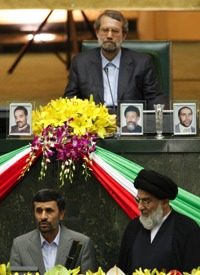
Mahmoud Ahmadinejad was sworn in for a second term as Iran’s president on August 5, as hundreds of opposition supporters demonstrated against his reelection.
Members of Iran’s parliament attended the ceremony in Tehran, but there were notable absences, including former president Akbar Hashemi Rafsanjani and defeated reformist candidate Mir Hossein Mousavi.
Shortly after the June 12 presidential election, the Islamic Republic News Agency, Iran’s official news agency, announced that Mousavi, Ahmadinejad’s leading opponent, had received 33 percent of the votes cast. Crowds of opposing demonstrators supporting both Ahmadinejad and Mousavi engaged in protests — and sometimes clashed — in the days following the election, in the wake of allegations of vote-count irregularities. The government responded by cracking down on protests and media coverage of any demonstrations not pre-approved by state officials.
Ahmadinejad is regarded as a hard-liner when it comes to dealing with the West and in enforcing strict Islamic law at home. He has backed Iran’s nuclear-fuel enrichment program, has called for the dissolution of Israel, and has befriended Venezuela’s leftist strongman, Hugo Chavez. The friendship between Chavez and Ahmadinejad appears to be based largely on their mutual antipathy for the United States.
VOA News cited a Iranian state-run media report that thousands of security forces were deployed near parliament to prevent demonstrators from gathering. Witnesses said that police detained several protesters in Tehran and used tear gas to break up demonstrations staged during the inauguration.
Iranian media also report that authorities on August 4 arrested one of Mousavi’s aides, Mir Hamid Hassanzadeh, who ran Mousavi’s official website during the election campaign.
The United States, Britain, France, Germany, and Italy have snubbed Ahmadinejad’s reelection by declining to send the customary messages of congratulation. In Tehran on July 4, Ahmadinejad assumed a posture of indifference by making a statement indirectly aimed at those countries’ leaders: "No one in Iran is waiting for your messages."
However, Britain did send its ambassador, Simon Gass, to attend the inauguration, defending its decision by saying it is necessary to keep channels of communication open with Iran to address any issues of concern that may arise. "Ambassador Simon Gass will attend the parliamentary event on Wednesday. We will not be sending a message of congratulations to Ahmadinejad. While ultimately a matter for (EU) member states, this follows informal EU coordination between embassies in Tehran," a British Foreign Office said.
Reuters news service noted that already-tense relations between Britain and Iran worsened after the election when Iran detained nine local employees of the British Embassy, alleging that they were involved in the post-election street protests.
Meanwhile, White House spokesman Robert Gibbs on August 4 withdrew a remark he made the previous day stating that Iran’s President Mahmoud Ahmadinejad had been "elected." The remark had aroused criticism among those who believe that the United States should do nothing that would tend to lend official recognition to the results of Iran’s contested election. "Let me correct a little bit of what I said yesterday. I denoted that Mr. Ahmadinejad was the elected leader of Iran. I would say that is not for me to pass judgment on," Gibbs told reporters on Air Force One. "He has been inaugurated — that’s a fact. Whether any election was fair, obviously the Iranian people still have questions about that and we’ll let them decide that."
AFP reported that on the morning of Ahmadinejad’s inauguration, Secretary of State Hillary Clinton, speaking from Kenya, expressed admiration for Ahmadinejad’s reformist opponents, saying: "We appreciate and we admire the continuing resistance and ongoing efforts by the reformers to make the changes that the Iranian people deserve."
However, Clinton said that the controversy surrounding the election would not alter Washington’s readiness to engage Iran: "Our policy remains the same. We take the reality that the person who was inaugurated today will be considered the president. We are still clear in our policy that engagement is on the table for the Iranians."
If that is current U.S. policy toward Iran, it shows greater restraint than our government has exhibited in recent years with some other nations. But hoping that our foreign policy will become one of nonintervention is probably too much to hope for.
We would like to see a policy as advocated by Rep. Ron Paul in his speech before the before the U.S. House of Representatives, "Iran: The Next Neocon Target," on April 5, 2006. After observing that "There is no evidence of a threat to us by Iran, and no reason to plan and initiate a confrontation with her," Rep. Paul concluded:
Conservatives, libertarians, constitutionalists, and many of today’s liberals have all at one time or another endorsed a less interventionist foreign policy. There’s no reason a coalition of these groups might not once again present the case for a pro-American, non-militant, non-interventionist foreign policy dealing with all nations. A policy of trade and peace, and a willingness to use diplomacy, is far superior to the foreign policy that has evolved over the past 60 years.
Photo: AP Images



